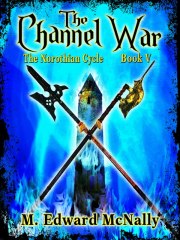Don’t be too sad. Genre had a long and productive life, full of service to the reading community. There was a time, not so very long ago, when it was actually an important and useful way for somebody to find a book they might like to read.
See, there used to be these places called “bookstores,” actual structures you had to leave your house to go to when you wanted something to read. Once there, you could choose from a myriad of books – not as many as you might find through a search for “public domain” on a Kindle perhaps, but still, thousands and thousands. Enough so that without some signposts pointing the way toward certain things, you’d likely be lost.
That’s where Genre came in. When you have a physical book in a physical room full of physical shelves, you have to pick one to put it on. And since you want other people to be able to find it, you put it on the same shelf as other books that are in some way similar. And since most people don’t walk around muttering the Dewey Decimal System under their breath (“Can I see something in a 740.200 to 745.500 range?”), you put a word on the end of the aisle like Mystery, or Sci Fi, or General Fiction. And that’s Genre.
And suddenly, boom. A place for everything, and everything in its place. More or less. Fantasy may have been intermixed with Sci Fi, and General Fiction might run the gamut from James Joyce to Judy Blum, depending on exactly how many shelves were in the store. But close enough for horseshoes, hand grenades, and thermo-nuclear warfare.
Alack and alas, it does indeed seem that those sorts of stores are going the way of the Dodo bird, CDs, and one-pound cans of coffee that actual held one pound of coffee. And with them, I do posit, goes the idea of Genre as we have come to know it. Because in a “virtual” bookstore with “virtual” shelf space, one “virtual” book can be everywhere, all the time, 24-7. No selling out of stock, no getting shipped back to the publisher to make space for a new release, no discontinued. An e-book is there, everywhere, forever.
So what is a classification system meant for the physical world to do? Well, probably two things. The first is to become ever more specific. Fantasy? Are you sure you don’t mean Urban Fantasy? How about Steampunk? Actually, that sounds a bit more Paranormal. Or Paranormal Romance. Or maybe YA Paranormal Romance.
To me and my ruminating noggin, this feeds directly into the second thing, which is simply this: Genre, at this stage, is really just a Keyword.
You like Fantasy? Okay, type “Fantasy” into a search engine at your preferred virtual purveyor of the digital word, and here’s a million of them. But the thing is, you are not standing in between shelves stocked with Fantasy books that you can’t find an aisle over, because that is only Thrillers o’er that way. If everything is everywhere all at once, it really can’t be called just one thing, and if I can try to herd the cats of my thoughts together at this point to say just one thing about it: I think that is kind of awesome.
Genre, as it was, was necessarily defined by commonalities. Book A has a lot of stuff in it sort of like Book B, so they both go on this shelf. But keywords don’t define, they only describe. A Fantasy book now can be a hundred other things as well, of equal or lesser importance, and it can be found by people who might like the story, even if they are sure they don’t like Fantasy, and never would have walked down that aisle at their corner bookstore. Readers can use keywords as tools to find what might interest them, without cutting themselves off from the full range of options. And if readers can do that, then writers can write that way, too. Not with one shelf in mind as a destination, but with the world of possibilities before them.
So rest easy, Genre. You did your work well, and ever so many of us will remember you quite fondly. But the next bunch of readers on the way up, the kids with the Kindles and the newbies with the Nooks, they might come to look at you as something like an Eight-Track player. How quaint, and limiting, and arbitrary.
Thanks for reading, anything and everything,
Ed






